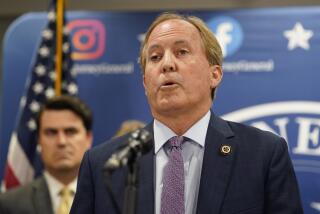When Your Conscience Goes to Work
- Share via
I once worked in a philosophy department in which one of the professors was active in NAMBLA, the controversial North American Man/Boy Love Assn. The secretary, a deeply religious woman named Judy, was assigned the task of typing up his man-boy love book manuscript and sending it off to the publishers.
She came close to quitting, but she was the sole provider for three children. Finally, she held her nose and typed one-handed.
I think of Judy when I think about the issue of whether pharmacists should be permitted to refuse to fill prescriptions at which their conscience balks. The conscience of some pharmacists balks at birth control and morning-after pills.
Illinois Gov. Rod Blagojevich on April 1 issued a 150-day emergency order requiring pharmacists to fill contraceptive prescriptions after a Chicago druggist refused to dispense birth control pills. Elsewhere, reproductive-rights groups are pressuring lawmakers to establish professional-duty laws for pharmacists.
I personally am no opponent of birth control of any sort or, for that matter, of abortion rights. But people whose jobs require them to violate their own deeply held convictions ought to refuse to do the job, and any politician who upholds freedom or dignity must uphold their right to do so.
What you should ask yourself in this case is not whether you think people should have access to birth control, but whether you should be required to do things that violate your deepest convictions. Should a soldier be required to torture prisoners, for example? Should he refuse to do so if ordered? Should a liberal corporate peon be required to contribute to the Republican Party? Should a Christian secretary have to assist in the advocacy of man-boy love?
Sadly, these sorts of questions cannot be answered according to whether the act involved is objectively right or wrong because, in every case, that’s the heart of the dispute and irresolvable by organizational policy, legislation or court proceeding. They are questions that are answerable only for you as you face the decision, as you face yourself.
It would be nice not to confront any moral dilemmas, to slough off all responsibilities onto bureaucracies, to be blameless and pure even as you do things that you find abominable. That’s nice for individuals because it makes them blameless for any crime, as long as it appeared to follow from one’s function or role in the bureaucracy.
But, of course, it is a disaster for human beings in general because when individuals have no responsibility, they start robbing, raping, pillaging and murdering. And why not? There’s absolutely nothing wrong with that if it’s part of your job.
The modern world of bureaucracy is intent on expunging every individual and making each a mere space on the flow chart. Human beings are liquidated into functions: secretary, pharmacist, police officer, fry cook. But you can’t offload your beliefs that easily, and when your job requires you to do something that you regard as evil, it’s you who does it, not your space on the flow chart. And in the attempt to reduce people to functions lurks the nightmare: It’s been the justification for the worst things our species has ever done. It’s the Nuremburg defense on a smaller scale.
If you claim the right to behave in accordance with your conscience, then you also must accord that right to all others, even pharmacists.
Nothing else is compatible with human dignity, decency, individuality and truth.
So as I urged Judy not to type, I urge these pharmacists not to dispense.
More to Read
Sign up for Essential California
The most important California stories and recommendations in your inbox every morning.
You may occasionally receive promotional content from the Los Angeles Times.










